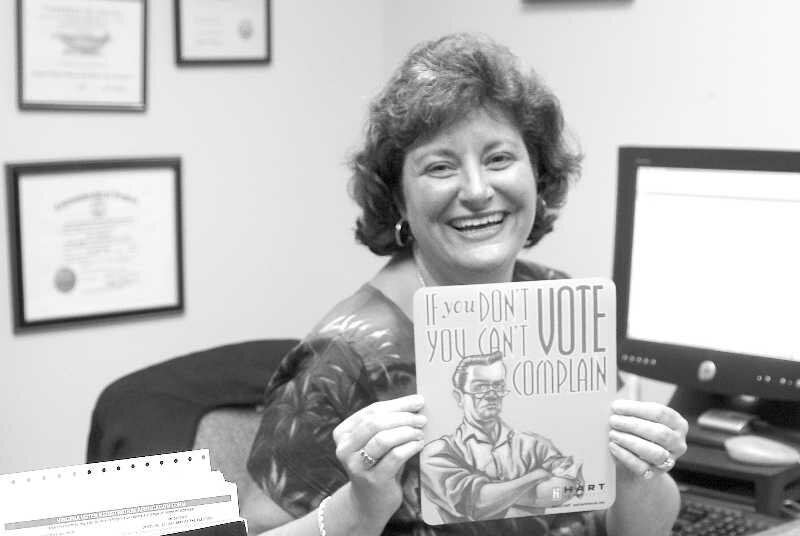Record voter registration, no sign of fraud
 City registrar Sheri Iachetta expects record turnout– as much as 85 percent of registered voters– on election day.
City registrar Sheri Iachetta expects record turnout– as much as 85 percent of registered voters– on election day.FILE PHOTO BY JEN FARIELLO
Across the country, cries of voter registration fraud have been ringing out, with ACORN–- a nonprofit that works to register disadvantaged voters–- at the center of the controversy after the names of dead people, fake people, even Mickey Mouse recently showed up in the stacks of new registration forms.
Here in Charlottesville, voter registration has soared to record heights in both the city and the county, but registrars in both localities say they've seen no sign of fraud.
"I know ours are legitimate," says city registrar Sheri Iachetta of the thousands of new voter applications she and her staff have processed in the last two months. Yesterday, the deadline for Virginia registrars to report voters, the city's registration topped out at 28,646–- up from 21,000 in 2004–- an increase Iachetta calls "unbelievable."
Despite the eye-popping increase, Iachetta says the likelihood of registration fraud is slim, thanks to a set of checks and balances. The Virginia voter registration database, she explains, is linked to the DMV, the State Police database and the Virginia Health Department's Division of Vital Records and Health Statistics, ruling out several possible areas of fraud: the registration of one person in multiple Virginia localities, the registration of felons, as well as the registration of dead people.
The biggest problem Iachetta faced was incomplete forms. In those cases, she says, she or her staff contacted the person to complete the form and if that was not possible, returned the form and declined the registration.
County registrar Jake Washburne says he hasn't seen any sign of fraud despite the swelling of registered County voters from 58,479 in 2004 to 67,259 this year (with another 50 or so left to add by hand).
An increase in UVA student registration helped swell the rolls, but Iachetta and Washburne say an examination of specific precincts reveal students do not make up the majority of new voters. For instance, the Venable precinct, which covers much of UVA's off-campus housing, increased from 4,200 in 2004 to 5,615 this year, accounting for about 19 percent of new city voter registrations. In the County, the two precincts with the highest percentage of on- and off-campus housing– East Ivy and University Hall precincts– saw their voter rolls grow from a combined total of 1,242 to go from 3,268 registered voters on August 29 to a final total of 4,510, accounting for just 14 percent of new county voters
That students are not the majority of new voters might assuage the concerns of some local citizens who fear the potential for voter fraud by out-of-state students who, theoretically, could be registered to vote in two states.
Iachetta and Washburne say they've heard this concern expressed repeatedly.
"I really get frustrated by people talking about voter fraud" but having no evidence of it, says Iachetta. "If there's voter fraud, bring it to my attention."
Washburne, while acknowledging such fraud is possible, says he doubts it's likely thanks to the warning printed on each registration explaining that voter fraud is a felony. Voters are required to reveal if they are registered anywhere else, and Iachetta and Washburne both say hundreds of new city and county registrants have acknowledged registration in other states. In those cases, Iachetta and Washburne have sent official letters to other states requesting that the new Virginia voters be removed from those states' voter rolls.
To anyone considering double registration and double voting, Washburne offers words of caution. In the "near future," he says, there will be a national voter registration database that will allow states to cross reference their own voter rolls with the rolls of other states for present and past elections. There is no statute of limitations on voter fraud, says Washburne, so if anyone commits it this year, they could face serious charges in the future.
Now that registration is over, Iachetta and Washburne say they'll turn their attention to training election officials to ensure smooth voting on election day. In the city, voters will have a choice this year between electronic voting machines and paper ballots, which will be counted on new optical scanners. County residents, as in the last several elections, will vote solely on electronic machines.
The massive increase in registered voters suggests a hectic election day and perhaps long lines, but both Iachetta and Washburne say they've welcomed the additional work the massive registration drive created.
"We do this every year," says Iachetta, "but it's really exciting to see all the enthusiasm this year. I just challenge all of these new voters to be involved in the process next year and in years to come."
Anyone wishing to confirm their registration can visit the State Board of Elections website to check their status online.